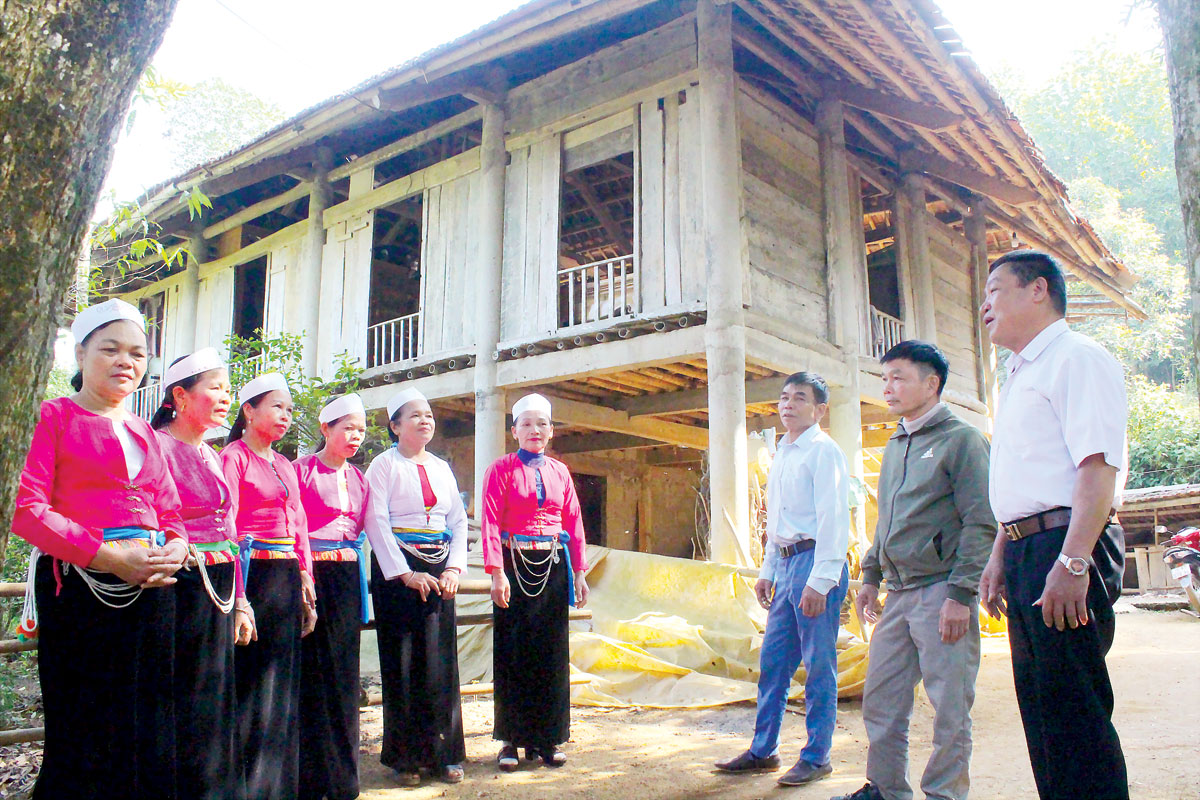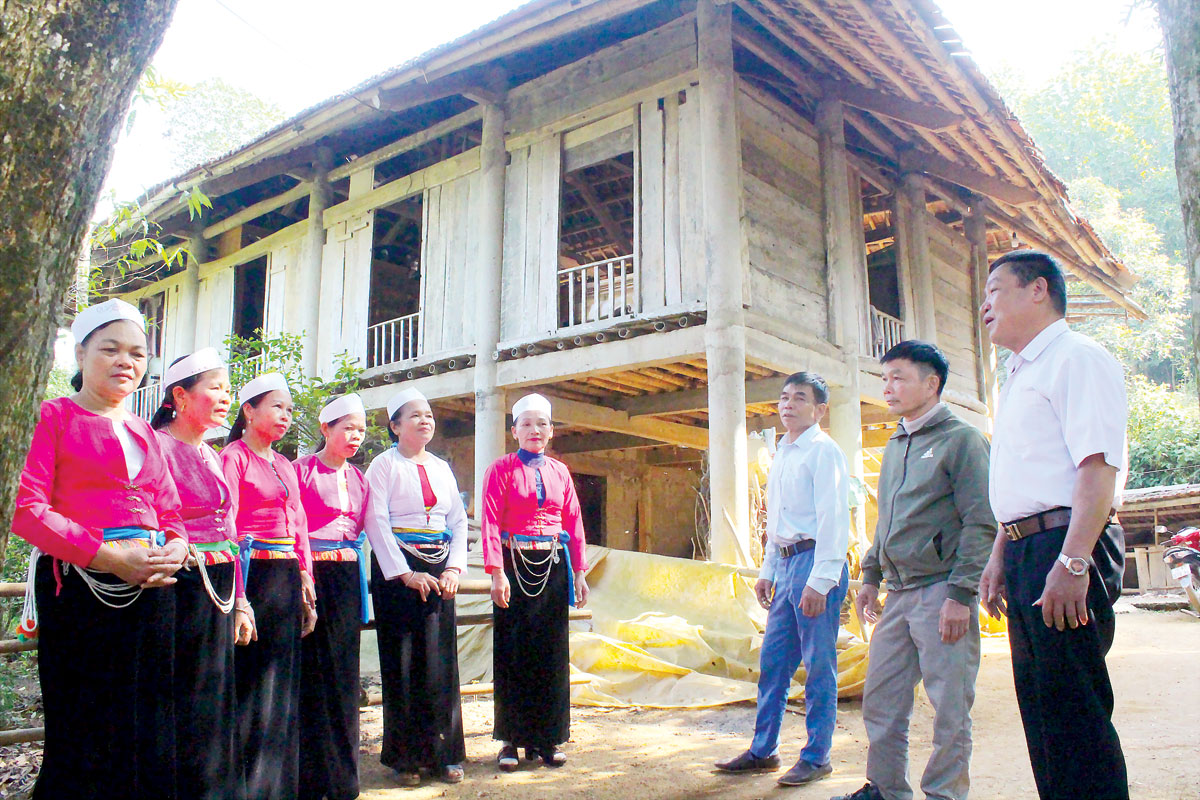
(HBO) – In spite of the change of the social life, Muong ethnic people in Hoa Binh province’s Lac Son district still consciously preserve unique cultural identities of the locality, especially folk songs, said Bui Van Nom, former Secretary of the district Party Committee.

Muong ethnic people in Lac Son exert efforts to preserve popular folk songs.
Nom, who is devoting himself to the collection and preservation of folklore culture
values of the nation, said Muong folk songs are becoming more and more popular in the daily life of the local community.
According to
folklore researcher Bui Huy Vong, Lac Son is considered to be the core zone of
Muong people in Hoa Binh province and their culture.
For a long
time, people here have considered Muong folk songs in general, and Thuong Rang, Bo Meng and Dum singing popular cultural
practices in the daily life. The singing styles have become the
intangible cultural heritage of the locality bearing cultural, historical and
human values.
Local people sing not only on the
occasions of weddings, new house celebrations, festivals, and cultural and
artistic exchanges, Muong folk songs are becoming more and more popular through
the lullabies, when men and women declaring their love to each other while working
in the fields and gardens.
In recent
times, Thuong Rang, Bo Meng and Dum singing has been organised in many
festivals, becoming the highlight in festivals and mass art contests in the
district.
Along with preserving the cultural identity of Muong ethnic people in general, the
local authorities have also paid attention to keeping and developing Muong folk
songs.
As part of efforts to preserve and promote this unique
cultural value, a number of folk singing clubs have been established, such as
Muong Khai and Muong Khoi in An Nghia commune, and Bai Chim in Tan My commune.
Some artists and those who are devoting
themselves to preserving Muong folk songs such
as Bui Thien, Bui Huy Vong, and Bui Van Nom, have organised over 30 performance
exchange programmes, counted over 300 artists singing folk songs, old Muong
songs, and stored nearly 1.000
GB of relevant video and audio data.
Fork song
artist Bui Van Tien in Song Khanh village of Tan My commune, who is head of Bai
Chim Club, said Bua, Rang, Vi and Dum singing styles of Muong people feature epics
and legends, reflect the daily life, customs and beliefs, and express the
desire for a prosperous life of Muong people in Hoa Binh.
The singing styles originated from the working life of the people and are handed downorallyfrom
generation to generation. Local people sing Muong folk songs in festivals of early spring.
Apart from Rang singing, the Muong people in Lac Son also retain Sac Bua
singing in in spring festivals, Nom said. The unique
culture of Muong people has been passed down through generations, bringing in a
strong and long-lasting vitality, becoming a cultural flow imbued with the
ethnic group’s unique cultural values. Muong folk
songs are on the way to be recognized as a national intangible cultural
heritage./.
With an increasingly vibrant and widespread emulation movement aimed at building cultured residential areas and cultured families, Yen Thuy District has been making steady progress toward improving both the material and spiritual well-being of its people, while fostering a civilized, prosperous, beautiful, and progressive community.
Once lacking recreational spaces and community facilities, Residential Group 2 in Quynh Lam Ward (Hoa Binh City) has recently received attention for the construction of a new, spacious, and fully equipped cultural house. The project followed the model of state support combined with public contributions in both labor and funding.
The "All people unite to build cultural life" movement, which has been effectively integrated with Kim Boi district’s socio-economic development goals, is fostering a lively spirit of emulation across local residential areas, hamlets, villages, public agencies, and enterprises. In addition, through the initiative, traditional cultural values are being preserved and promoted, while community solidarity and mutual support in poverty reduction and economic development are being strengthened.
A working delegation of the Hoa Binh provincial People’s Committee led by its Permanent Vice Chairman Nguyen Van Toan on June 11 inspected the progress of a project to build the Mo Muong Cultural Heritage Conservation Space linked to tourism services in Hop Phong commune, Cao Phong district.
Born and growing in the heroic land of Muong Dong, Dinh Thi Kieu Dung, a resident in Bo town of Kim Boi district, in her childhood was nurtured by the sweet lullabies of her grandmother and mother. These melodies deeply imprinted on her soul, becoming an inseparable part of her love for her ethnic group's culture. For over 20 years, this love for her hometown has driven Dung to research, collect, and pass down the cultural values of the Muong people to future generations.
In the final days of May, the Ethnic Art Troupe of Hoa Binh Province organized performances to serve the people in remote, mountainous, and particularly disadvantaged areas within the province. These were not just ordinary artistic shows, but they were the meaningful journeys aimed at spreading cultural values, enhancing the spiritual life of the people and contributing to the preservation of ethnic minority cultural identities.



